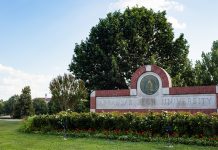 When Baswell Techionery is dedicated on the Arkansas Tech University campus this weekend, it will be yet another reflection of one man’s love for his alma mater.
When Baswell Techionery is dedicated on the Arkansas Tech University campus this weekend, it will be yet another reflection of one man’s love for his alma mater.
Col. Carl Franklin Baswell, a 1942 graduate of Arkansas Tech and a 2009 inductee into the Arkansas Tech Hall of Distinction, will be the guest of honor when the second facility at Tech bearing his name is formally dedicated at 1:30 p.m. on Saturday, Sept. 24.
“I give my support to the school that needs it,” said Baswell. “Arkansas Tech is building up and on the rise. It is a fantastic place. Things are happening at Arkansas Tech, and as time goes along, I become more and more a firm believer in universities like Tech.”
Baswell’s service to the United States took him to far away places like Panama and Korea, and to some of the most noteworthy datelines of World War II. He received the Bronze Star, the Purple Heart Medal, the Legion of Merit Medal with Oak Leaf Cluster and the Air Force Commendation Medal.
His story began on May 18, 1922, in Heber Springs, Arkansas, where he was born to Ross and Ruby Baswell. He graduated from Heber Springs High School in 1940, and it was a fellow Heber Springs graduate who persuaded Baswell to attend Arkansas Tech.
“There was a young man from Heber Springs by the name of Charles Ward, and he was the editor of the Arka Tech (newspaper),” said Baswell. “He had encouraged me to come over to Tech, and I received a scholarship because I graduated third in my class. I went over in 1940, and to sustain myself I worked in NYA (National Youth Administration) at Arkansas Tech. I remember we were permitted to earn up to 15 cents per hour, and we could earn up to $17.50 per month. Fifteen of that went toward our subsistence, and we got to put the other $2.50 in our pocket.”
Baswell graduated from Tech a few short months after the event that helped determine the course of his life and the lives of many young men from that era.
“I was at Tech when Pearl Harbor happened,” said Baswell. “I can remember coming out of the Rialto Theater in downtown Russellville on Dec. 7, 1941, and someone told me that Pearl Harbor had been bombed. I didn’t even know where that was. I had only left Arkansas once before I joined the Army, but once I got in I was able to travel and see things I’d never seen before. I liked that travel, and I decided right there and then that I was going to make the Army a career. Once I advanced up to the ranks of lieutenant and captain, my goal became to stay in the Army to make full Colonel. And I did it.”
Baswell was wounded during the largest land battle that the United States participated in during World War II, the Battle of the Bulge. Approximately 119,000 men, including 19,000 Americans, perished at the Battle of the Bulge.
Baswell was evacuated to England until near the end of the war in 1945.
“As a young lieutenant like I was, you’re not too high up on the totem pole,” said Baswell of his World War II experience. “I was just focused on what I was doing.”
The years after WW II brought a wide variety of experiences to Baswell’s life. He helped oversee the reconstruction of numerous destroyed bridges on the German Autobahn and served in the Korean War.
Baswell worked with the Army Corps of Engineers in the Little Rock district office, where he helped with the construction of the Greers Ferry Dam near his hometown of Heber Springs, the same project that had inspired him to become an engineer as a young boy.
After more than a quarter-century of service, Baswell achieved his career goal when he was promoted to Colonel in 1969.
Baswell entered the private sector after his retirement from the U.S. Armed Services. He was director of international operations for KLEE KG, a German international construction and service firm, from 1974-92. Today, he remains an active engineering and business consultant.
His generous financial support of Arkansas Tech has included funds for scholarships and a gift during the Return to Glory campaign. Baswell Residence Hall was dedicated in his honor in 2007.
“People ask me, if I had it to do over again, what would I do differently,” said Baswell. “I wouldn’t do anything differently. If you change one thing, you make a mistake somewhere else. I wouldn’t change any of it.”
]]>




